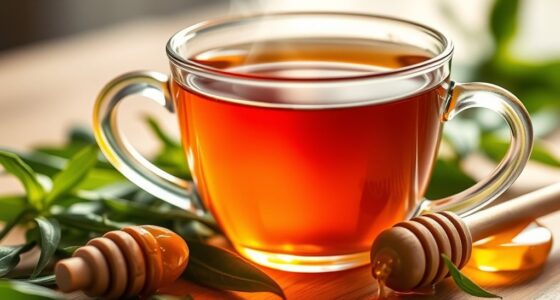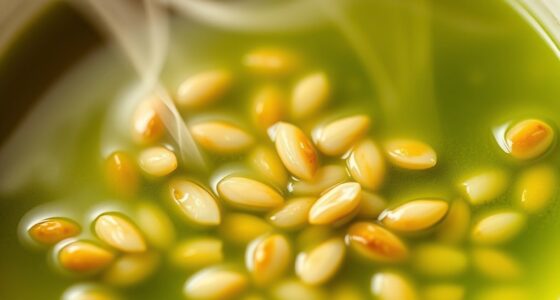Many people report health benefits from regularly drinking herbal infusions, including increased energy, reduced stress, and improved overall wellness. They choose herbs like chamomile, lavender, ginger, and turmeric for their antioxidant and anti-inflammatory properties. These infusions help support the immune system, improve digestion, and fight oxidative stress. If you’re curious about how others are experiencing these benefits and want practical tips, you’ll discover more insights ahead.
Key Takeaways
- Case studies show individuals using herbal infusions like chamomile and lavender report reduced stress and improved sleep quality.
- Research highlights users experiencing decreased inflammation and pain after regularly consuming ginger and turmeric-infused teas.
- Many individuals report increased energy levels and enhanced immune function with antioxidant-rich herbal blends.
- Studies indicate people incorporating herbal infusions for detox and cellular repair experience better overall health outcomes.
- Testimonials reveal improved skin health and resilience from consistent use of herbal teas supporting oxidative stress reduction.

Many people turn to tea not just for its comforting taste but also for its potential health benefits. One of the most popular ways they do this is through herbal infusions, which are crafted from various herbs, flowers, and roots rather than traditional tea leaves. These herbal infusions are celebrated for their unique flavors and, more importantly, their health-boosting properties. When you explore different herbal infusions, you may notice that many are rich in antioxidants, compounds that help neutralize free radicals in your body. This antioxidant activity can support your overall health, potentially reducing the risk of chronic diseases and promoting cellular repair.
People using herbal infusions often report feeling more energized and less stressed after regular consumption. For example, chamomile and lavender infusions are renowned for their calming effects, helping to ease anxiety and improve sleep quality. Meanwhile, herbal blends like ginger and turmeric are used to combat inflammation and boost immune function. These infusions are easy to prepare and integrate into daily routines, making them accessible options for those seeking natural health remedies. By choosing herbal infusions with high antioxidant properties, you’re providing your body with protective compounds that can fight oxidative stress, a common factor in aging and illness.
In case studies, individuals have shared how incorporating herbal infusions into their daily lives has influenced their health positively. Some report reduced inflammation and pain, especially those dealing with arthritis or muscle soreness. Others note improvements in digestion and better overall energy levels. These benefits are often linked to the antioxidants present in the herbs used for infusions, which help combat oxidative damage at the cellular level. You might find that switching from sugary drinks to herbal infusions not only enhances your hydration but also supplies your body with essential antioxidants. Over time, this can translate into better skin, improved immunity, and a greater sense of well-being.
Furthermore, herbal infusions offer a customizable approach to health. You can blend herbs based on your specific needs—whether you want to detox, relax, or boost your immune system. The antioxidant properties of these herbs make them a valuable addition to your health regimen, especially when consumed regularly. Many people who prioritize natural remedies find that herbal infusions are a gentle yet effective way to support their body’s defenses. When you choose herbal infusions rich in antioxidants, you’re actively helping your body fight off damage from environmental toxins and everyday stressors. Incorporating antioxidant-rich herbs into your routine can enhance your health benefits and protect your cells from oxidative stress. Overall, herbal infusions are a simple, enjoyable step toward better health, backed by the natural power of antioxidants.
Frequently Asked Questions
Are There Any Side Effects From Drinking Large Amounts of Tea?
Drinking large amounts of tea can cause side effects, especially if you’re caffeine sensitive. You might experience insomnia, nervousness, or increased heart rate. Tannin effects can also upset your stomach or interfere with iron absorption. If you consume excessive tea regularly, these issues could worsen. To avoid problems, limit your intake and monitor how your body responds, especially if you notice any adverse symptoms related to caffeine or tannins.
How Long Does It Take to See Health Improvements From Tea?
Like a sunrise signaling new beginnings, your health improvement timeline from tea varies. Typically, you might start noticing benefits within a few weeks, but significant changes could take a month or more. Timing expectations depend on factors like your lifestyle and the type of tea you consume. Stay consistent, and patience will be your guide, helping you see how small sips can bring about meaningful wellness over time.
Can Tea Replace Conventional Medicine for Health Issues?
Tea can’t replace conventional medicine for health issues. While herbal alternatives like tea can support your well-being, you should always consult a medical professional for diagnosis and treatment. Relying solely on tea might delay necessary medical care, so keep open communication with your doctor. Use tea as a complementary option, not a substitute, ensuring you’re making informed decisions about your health and treatment plans.
Which Types of Tea Are Best for Specific Health Benefits?
Think of choosing tea like matching a key to a lock. For antioxidant content, go for green or white tea—they’re packed with health-boosting compounds. Herbal blends like chamomile or peppermint are great for relaxation or digestion. Black tea offers heart benefits, while oolong supports metabolism. Pick your tea based on your health goals, but remember, no tea alone can replace a balanced diet or medical advice.
Is There Scientific Evidence Supporting All Claimed Health Benefits of Tea?
You might wonder if there’s scientific validation behind all health benefit evidence claimed for tea. While many studies support benefits like antioxidant properties and heart health, not all claims have strong scientific backing. You should be cautious and look for peer-reviewed research, as some benefits are still under investigation. Overall, tea has proven health benefits, but not every claimed advantage is fully supported by scientific validation.
Conclusion
As you consider these stories, one thing becomes clear: tea holds secrets yet to be fully uncovered. Will future generations discover even greater health benefits hidden within its leaves? The journey of exploring tea’s potential is far from over, and your own experience could be the next chapter. Stay curious—because the true power of tea might just surprise you when you least expect it. So, are you ready to unveil its mysteries?










